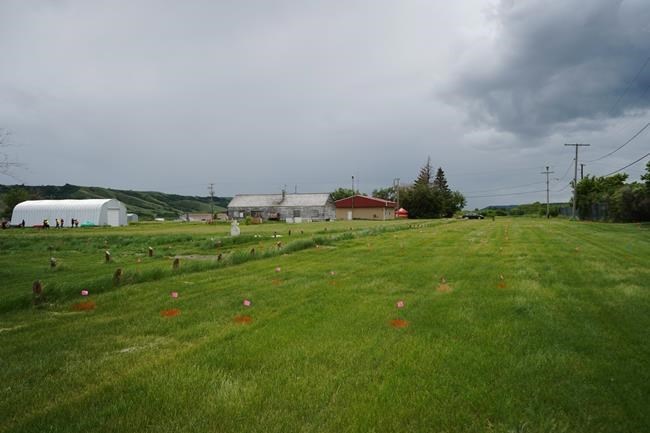
Flags mark where ground-penetrating radar recorded hits of what are believed to be 751 unmarked graves near the grounds of the former Marieval Indian Residential School on the Cowessess First Nation in Saskatchewan in this undated handout photo provided by the Federation of Sovereign Indigenous Nations. THE CANADIAN PRESS/HO, FSIN *MANDATORY CREDIT*
Republished June 24, 2021 - 3:46 PM
Original Publication Date June 24, 2021 - 8:26 AM
Eagleclaw Thom cried on the phone with family members as they shared stories of attending a former Saskatchewan residential school where a search has revealed what are believed to be 751 unmarked graves.
Thom said the discovery on the grounds of the Marieval Indian Residential School announced by the Cowessess First Nation on Thursday left a hole in his heart.
Thom, 40, is from the Sakimay First Nation that borders Cowessess and did not attend Marieval, but his father and paternal grandparents did. Some of his siblings attended different schools throughout the province.
"People may have been able to leave or escape residential school, but it never left them," Thom said from Ottawa.
"There was a cultural genocide, but there was also a genocide of our people."
Cowessess Chief Cadmus Delorme promised that memories of those who died at Marieval will not be wiped out. He said work will be done so a name is placed on each of the unmarked graves he said may have had markers or headstones that were removed in the 1960s.
"The Catholic Church representatives removed these headstones, and today they are unmarked graves," Delorme said.
"We want to honour our loved ones that lay there today,” he said. "We want to make sure that we keep that place and preserve it so many could come here and heal."
The Archdiocese of Regina shared a letter it sent to Delorme, which said it has had conversations with the First Nation about abuse at the school, unmarked graves and how one priest destroyed headstones.
"As you have communicated elsewhere, Chief Cadmus, even for those of us who were not there or not involved, it is nonetheless the painful legacy that we need to carry," Archbishop Don Bolen wrote.
Spokesman Eric Gurash also said the archdiocese contributed $70,000 to the First Nation for cemetery restoration.
The grave search began earlier this month using ground-penetrating radar that recorded 751 hits. The number would be the highest to date found in Canada. Delorme said the technology has a 10 to 15 per cent error rate.
“But we do know there are at least 600 (graves).”
The existence and number of graves does not come as a surprise to those yet living who attended the school, he said.
"Over the past years, the oral stories of our elders, of our survivors and friends of our survivors, have told us they knew these burials were here," said Delorme.
At a virtual news conference, he showed a photo of a grassy field with 751 coloured flags sticking out of the ground.
"The grave site is there and it is real."
Last month, a First Nation in British Columbia revealed that ground-penetrating radar had found what are believed to be the remains of 215 children buried at a former residential school in Kamloops. The school was once the largest in Canada's residential school network.
An estimated 150,000 First Nations, Inuit and Métis children attended residential schools between the 1860s and 1996. The Truth and Reconciliation Commission documented stories from survivors and families and issued a report in 2015 which detailed mistreatment, including emotional, physical and sexual abuse. It said there were at least 4,100 deaths.
The Cowessess school, about 160 kilometres east of Regina, was built in 1899 by Roman Catholic missionaries. Delorme said it closed in 1996.
Delorme said he's hoping to get school records held by the church and has "full faith" they will be released.
The search for remains will continue, he said. The discovery was made within the bounds of a Roman Catholic grave site, but survivors believe people who were not baptized or too young to be baptized were buried outside the grounds, he said.
Prime Minister Justin Trudeau said he was terribly saddened.
"The hurt and the trauma that you feel is Canada’s responsibility to bear, and the government will continue to provide Indigenous communities across the country with the funding and resources they need to bring these terrible wrongs to light," Trudeau said in a statement.
Chief Bobby Cameron of the Federation of Sovereign Indigenous Nations, which represents 74 First Nations in Saskatchewan, said the graves provide "evidence of what the survivors of the Indian Residential Schools have been saying all along for decades."
"We are seeing the results of the genocide that Canada committed here," said Cameron. "Genocide on our treaty lands."
Cameron said the federation will search every school site as well as the grounds of sanatoriums — so-called "Indian hospitals" — and "all the sites where our people were taken and abused, tortured, neglected and murdered.""
"We will find more bodies and we will not stop until we find all of our children."
Survivors and their descendants will need time to "heal and get stronger," he said.
"We are not asking for pity, but we are asking for understanding. We need time to heal, and this country must stand by us."
The Indian Residential Schools Resolution Health Support Program has a hotline to help residential school survivors and their relatives suffering trauma invoked by the recall of past abuse. The number is 1-866-925-4419.
This report by The Canadian Press was first published June 24, 2021.
News from © The Canadian Press, 2021